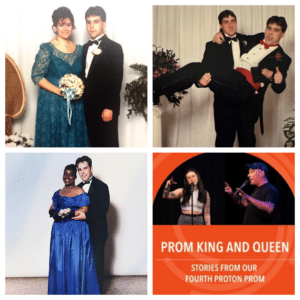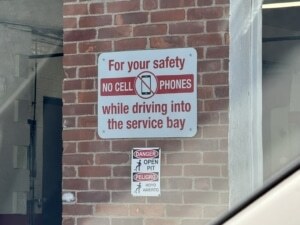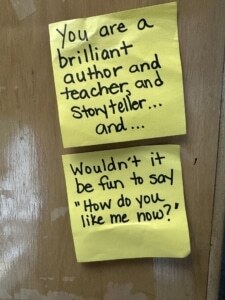Matthew Dicks's Blog, page 51
July 2, 2024
My odd, unexpected history with proms
A couple of weeks ago, I performed onstage in New York for The Story Collider, an organization that seeks to help scientists share stories about their work, at its annual fundraiser, The Proton Prom.
This week, that story is airing on their podcast alongside another storyteller who performed that night.
They are marketing the podcast as the “Prom King and Queen” episode.
I have quite a history with proms.
When I was in high school, I attended many proms:
My junior and senior proms and those of my girlfriend, Laura, who was a year younger than me.
That made four.
Laura and I also attended the Nipmuc Regional prom with friends from that school. Each friend pretended to take Laura and me as their dates so we could spend the night together, dancing and having fun.
That made five.
I also attended the Nipmuc Regional prom the following year while dating another girl named Lisa after Laura and I broke up.
That made six proms.
I also attended the Hopedale High prom with a girl named Sherry, whom I worked with at McDonald’s. Sadly, Sherry was chronically shy – she invited me to the prom via a slip of paper – and knew almost no one there. In fact, I had more friends from Hopedale High than she did, so about an hour into the prom, with Sheery looking deeply uncomfortable, I asked if she wanted to leave, and she quickly said yes.
I took Sherry to a movie in my tuxedo and her gown, followed by burgers and ice cream at Dairy Queen.
We had a great time. Thanks to our formal wear, we were a bit of a spectacle, but somehow, our clothing, combined with our anonymity, allowed Sherry to relax and enjoy the night.
Sadly, Sherry thought this night was the beginning of a relationship, even though she knew my girlfriend and worked alongside her often. Sherry became angry when I didn’t break up with my girlfriend and eventually handed me a letter at work containing a threat to kill herself if we couldn’t be together. I panicked and asked my manager for help, and soon after, Sherry’s parents arrived at McDonald’s to pick her up, and I never saw Sherry again.
That made seven.
Three years later, I took a girl named Francis to her prom at Brockton High School. I was 21 years old at the time, and though Francis and I were very good friends, she was three years younger than me and not exactly hanging out with me outside of work. But Francis’s mother was nervous about sending her daughter to the prom, so she asked me to escort her.
I also had many friends at that prom, including many teenagers I had worked with in Brockton for years, so we had a great time.
It was my eighth and final prom, I thought.
Ten years later, my school decided that our holiday party would be prom-themed, so my colleagues and I got dressed in as much formal wear as we could muster for a party that very much felt like a prom. I was the DJ for the party, and because I was working professionally at the time as a wedding DJ, I owned a tuxedo and wore it to the party.
Halfway through the night, the king and queen of the prom were announced, and surprisingly, my colleague Debby and I were named king and queen. Plastic crowns were placed atop our heads, and we opened the dance floor by dancing together as my CDs spun in their players without me.
That was my ninth and final prom, I thought.
But then came the Proton Prom last month, which admittedly felt the least prom-like of all the proms I’ve ever attended. I was accompanied by my friend, Kaia, and once again, I knew many people in attendance – storytellers, producers, and longtime friends in New York.
I wore jeans and a tee shirt this time, and since there was no music, I did not dance. Instead, I stood on the stage and told a funny, heartfelt story about Clara. For the second time in what now amounts to ten proms, I was declared the prom king.
I’d like to say that this was my tenth and final prom, but I know better now. Though I can’t imagine another prom in my future, proms and I seem to have an interesting, unexpected, and at least one-time tragic relationship that I will not assume is over just yet.
Possibility abounds. And as a friend recently said, “Nothing about your life is ever normal.”
Not true, of course, but in some instances, at least a little bit true.

July 1, 2024
Resolution update: June 2024
1. Don’t die.
I was dropped off by an Uber driver in Scottsdale, Arizona, well after midnight, in a dark, sketchy place about a mile from my hotel.
I thought it was a set-up, and I was about to be jumped. I was momentarily excited about the prospect of fighting a small handful of bad guys because I’m an idiot.
Instead, I only had to survive the 95-degree walk to the hotel.
Thus, I’m still alive.
LIKELIHOOD OF COMPLETION IN 2024: Excellent
2. Lose 10 pounds.
I lost two pounds in June. Back to even.
These ten pounds are not falling off like the 38 pounds I lost in 2023, which is quite annoying.
LIKELIHOOD OF COMPLETION IN 2024: Excellent
3. Do a targeted push-up workout at least four times per week.
Done.
LIKELIHOOD OF COMPLETION IN 2024: Near certainty
4. Complete 100 sit-ups four times per week.
Done.
LIKELIHOOD OF COMPLETION IN 2024: Near certainty
5. Complete three one-minute planks four times a week.
Done.
LIKELIHOOD OF COMPLETION IN 2024: Near certainty
6. Cycle for at least five days every week.
Done. I missed only three days in June due to traveling, but I also cycled more than once on several days.
I’ve recorded 182 rides in 182 days in 2024.
LIKELIHOOD OF COMPLETION IN 2024: Near certainty
7. Meet or beat the USGA’s average golfing handicap for men of 14.2.
My current handicap is 27.3.
Ouch.
The sad thing:
I’m playing better than ever before.
LIKELIHOOD OF COMPLETION IN 2024: Doubtful
WRITING CAREER8. Complete my eighth novel.
I continue to work on the book based on the editor’s feedback. I am making excellent progress. I suspect it will be done by July.
LIKELIHOOD OF COMPLETION IN 2024: Near certainty
9. Write my next Storyworthy book.
I still need to meet with my agent and editor to determine the subject of this next book.
I have a great idea, but I suspect they will want a different idea.
LIKELIHOOD OF COMPLETION IN 2024: Possible
10. Write, edit, and revise my golf memoir.
I discussed this book with my agent last month and made a plan to proceed.
LIKELIHOOD OF COMPLETION IN 2024: Likely
11. Write my “Advice for Kids” book.
Solid progress was made in June. Inching along.
LIKELIHOOD OF COMPLETION IN 2024: Near certainty
12. Write/complete at least three new picture books, including one with a female, non-white protagonist.
I’m writing children’s books about Connecticut’s infamous October 2011 snowstorm and another about the gypsy moth invasion of New England in 1981. Rough drafts of both are complete. I’ll be reading them to my class in September for feedback.
I have two other ideas that I am also excited about.
LIKELIHOOD OF COMPLETION IN 2024: Near certainty
13. Write about my childhood in partnership with my sister, Kelli, at least twice per month.
Kelli and I spent a day together in February but forgot to discuss this topic. We still need to discuss.
LIKELIHOOD OF COMPLETION IN 2024: Possible
14. Launch a Substack.
Substack forthcoming. I’m in discussions with folks about how to monetize best.
LIKELIHOOD OF COMPLETION IN 2024: Likely
15. Write a new solo show.
All the work on this project is being done in my head since I’ve never written down anything I ever say onstage, so I don’t have much to show for my work, but I am working hard nonetheless. This month, I had a structural breakthrough that I’m excited about.
I’ll be debuting the show in November at TheaterWorks in Hartford.
LIKELIHOOD OF COMPLETION IN 2024: Near certainty
16. Write a musical.
No progress.
LIKELIHOOD OF COMPLETION IN 2024: Doubtful
17. Submit at least three Op-Ed pieces to The New York Times for consideration.
One story is still in progress.
LIKELIHOOD OF COMPLETION IN 2024: Possible
18. Write at least four letters to my father.
One letter written in 2024 so far.
LIKELIHOOD OF COMPLETION IN 2024: Likely
19. Write 150 letters.
I wrote 30 letters in June. Recipients included former students, clients, colleagues, friends, a student’s dog, and Clara, who is away at camp.
I’ve written a total of 105 letters in 2024.
LIKELIHOOD OF COMPLETION IN 2024: Near certainty
20. Write to at least six authors about a book I love.
I have now identified five authors to whom I will write. No actual writing has been done yet.
LIKELIHOOD OF COMPLETION IN 2024: Likely
STORYTELLING/SPEAKING CAREER
21. Perform a new solo show.
The month has been set:
TheaterWorks in Hartford in November. Dates should be finalized soon.
LIKELIHOOD OF COMPLETION IN 2024:
22. Complete the re-recording of Storyworthy For Business.
Re-recording began this month!
LIKELIHOOD OF COMPLETION IN 2024: Certainty
23. Record and produce at least two new Storyworthy courses.
I’ve produced this year’s webinars, which will be sold as separate courses, so I’m declaring this one complete.
We’ll also be carving up the new Storyworthy for Business course into smaller, separate courses, extending this goal considerably.
LIKELIHOOD OF COMPLETION IN 2024: Done
24. Produce a total of six Speak Up storytelling events in 2024.
Four shows produced in 2024 so far:
“Matt and Jeni Are Unprepared” on March 2 at TheaterWorks in Hartford.“Sportsing” on March 16 at the Connecticut Museum of Culture and History“School” on May 3 at Sedgwick Middle School in West Hartford, CTSpeak Up – CPA Prison Arts show on June 5 at The Pond House in West Hartford, CTWe also have the following show scheduled for 2024:
October 5: Rescheduled “Stores Sell: Storyworthy Strategies to Grow Your Business and Brand” release party at the Connecticut Museum of Culture and HistoryMore to come!
LIKELIHOOD OF COMPLETION IN 2024: Probable
25. Submit pitches to at least three upcoming TEDx events, hoping to be accepted by one.
No progress.
I spoke at TEDxBU on April 20. It went very well, and the recording should be online soon.
LIKELIHOOD OF COMPLETION IN 2024: Near certainty
26. Attend at least eight Moth events with the intention of telling a story.
I attended one Moth StorySLAM in June.
Six Moth events so far in 2024.
LIKELIHOOD OF COMPLETION IN 2024: Near certainty
27. Win at least one Moth StorySLAM.
Done again!
I won the Boston StorySLAM on June 25. My 61st Moth StorySLAM victory!
I also won a Boston StorySLAM on March 27.
I’ve won two out of three StorySLAMs so far this year.
LIKELIHOOD OF COMPLETION IN 2024: Done

28. Win a Moth GrandSLAM.
I competed in the Moth GrandSLAM in Boston in March and placed second.
I should’ve won, but I think that a lot.
I’ll be performing in a GrandSLAM in Seattle, NYC, and Washington, DC later this year.
LIKELIHOOD OF COMPLETION IN 2024: Possible
29. Pitch “You’re a Monster, Matthew Dicks” to at least a dozen theaters and/or directors in 2024.
I’ve pitched “You’re a Monster, Matthew Dicks” to one theater in January.
I performed the show on March 30 at the Mopco Improv Theater in Schenectady, New York. It went quite well.
I pitched the show to a Boston theater in June. No response thus far.
More pitching is planned for this summer.
LIKELIHOOD OF COMPLETION IN 2024: Possible
30. Produce at least 24 episodes of our podcast Speak Up Storytelling.
No progress.
LIKELIHOOD OF COMPLETION IN 2024: Possible
31. Perform stand-up at least six times.
No progress.
LIKELIHOOD OF COMPLETION IN 2024: Possible
32. Pitch three stories to This American Life.
One story has been pitched thus far.
LIKELIHOOD OF COMPLETION IN 2024: Near certainty
33. Submit at least three pitches to Marc Maron’s WTF podcast.
No progress.
LIKELIHOOD OF COMPLETION IN 2024: Near certainty
34. Send a newsletter to readers at least 50 times.
In terms of completing the goal, I’ve decided to count
My monthly Storyworthy newslettersAny other Storyworthy newsletters containing new contentSpeak Up newslettersWeekly “Homework for Life” newsletters I write for Storyworthy VIP membersGiven those categories, I’ve written 18 newsletters so far this year.
LIKELIHOOD OF COMPLETION IN 2024: Likely
HOME35. Organize the basement.
Incremental progress.
One of the problems with this goal is I’m not quite sure about the definition of “organized.” My standard might be unattainable. So I’m going to declare “organized” in this context to mean:
Organize all bins in the basement in a logical, identifiable orderEliminate anything no longer wantedStore Elysha’s classroom materials in an organized mannerBased on these three goals, progress remains incremental but feels much more doable.
LIKELIHOOD OF COMPLETION IN 2024: Possible
36. Clear the garage of unwanted items.
All large items are now gone. Huzzah!
Elysha’s long-forgotten classroom detritus must still be eliminated, but that is it!
It is likely a summertime job.
LIKELIHOOD OF COMPLETION IN 2024: Near certainty
FAMILY/FRIENDS37. Text or call my brother or sister once per month.
Done.
LIKELIHOOD OF COMPLETION IN 2024: Near certainty
38. Take at least one photo of my children every day.
Clara is at camp, so I can’t take a photo of her unless the camp posts one on its app.
Charlie was also in Washington, DC with the Scouts for five days, but he and his Scoutmasters took photos, so I didn’t miss a day.
Otherwise done.

LIKELIHOOD OF COMPLETION IN 2024: Near certainty
39. Take at least one photo with Elysha and me each week.
Just one photo with Elysha in June.
I simply don’t have the instinct to take a photo of myself, so unless ELysha or the kids think of it, it doesn’t happen.
LIKELIHOOD OF COMPLETION IN 2024: Unlikely

40. Plan a reunion of the Heavy Metal Playhouse.
No progress. But in a strange coincidence, a teacher in our school grew up in Attleboro, where the Heavy Metal Playhouse was located, and she is friends with the person who manages Crystal Village, where it was located.
Given how spread out my friends are today, an in-person reunion is probably impossible, but it gave me a little hope.
LIKELIHOOD OF COMPLETION IN 2024: Unlikely
41. I will not comment positively or negatively about the physical appearance of any person save my wife and children to reduce the focus on physical appearance in our culture overall.
Done.
LIKELIHOOD OF COMPLETION IN 2024: Near certainty
42. Surprise Elysha at least 12 times.
Three surprises in June:
“Tommy” on Broadway last weekCheesecake delivered to Elysha and her teammates during an especially challenging dayA surprise weekend spent in Rhode Island with friendsFive surprises in 2024 so far:
Tickets to “Little Shop of Horrors” on BroadwayTickets to “Merrily We Go Along” on Broadway“Tommy” on Broadway last weekCheesecake delivered to Elysha and her teammates during an especially challenging dayA surprise weekend spent in Rhode Island with friendsLIKELIHOOD OF COMPLETION IN 2024: Near certainty
43. Play poker at least six times.
No progress. I’m so dumb.
LIKELIHOOD OF COMPLETION IN 2024: Possible
44. Spend at least six days with my best friend of more than 30 years.
Two days spent together in June.
LIKELIHOOD OF COMPLETION IN 2024: Likely
MUSIC45. Memorize the lyrics to at least five favorite songs.
I memorized the lines to “Come a Little Bit Closer” by Jay and the Young Americans and “Fox on the Run” by Sweet.
Memorized so far:
“Our Wonderful Lives” by Styx
“Come a Little Bit Closer” by Jay and the Young Americans
“Fox on the Run” by Sweet
Three songs memorized in 2024 so far.
LIKELIHOOD OF COMPLETION IN 2024: Near certainty
46. Practice the flute at least four times per week.
I’ve practiced just once in June. Once the school year ended, my practice ended.
The barrier to this goal is this:
I played the flute from third to eighth grade and was a good player, so I expected to pick it right back up. This didn’t happen, so I feel like a failure every time I try to practice.
Which is stupid. Something I need to overcome.
LIKELIHOOD OF COMPLETION IN 2024: Unlikely
MISCELLANEOUS PROJECTS
47. Read at least 12 books.
I read five books in June, bringing my total to 14 so far, and thus, I completed the goal.
”You Like It Darker” by Stephen King
”A Short Guide to a Happy Life” by Anna Quindlen
”How to Say Goodbye” by Wendy McNaughton
”We’re All In This Together” by Tom Papa
”Smart Brevity” by Jim VandeHei, Mike Allen, and Roy Schwartz
I’m currently reading:
“The Power Broker” by Robert Caro
“Hello, Molly” by Molly Shannon
“Excellent Advice for Living” by Kevin Kelly
“The Deerfield Massacre” by James Swanson
Books read in 2024 include:
“Upstream” by Chip Heath”Happy Pepple Are Annoying” by Josh Peck”Comedy Comedy Comedy Drama” by Bob Odenkirk“The Power of Regret” by Daniel Pink“Fluke” by Brian Klass“Misfit” by Gary Gulman“How to Weep in Public” by Jacqueline Novak“The Anxious Generation” by Jonathan Haidt“The Demon of Unrest” by Erik Larson”You Like It Darker” by Stephen King”A Short Guide to a Happy Life” by Anna Quindlen”How to Say Goodbye” by Wendy McNaughton”We’re All In This Together” by Tom Papa”Smart Brevity” by Jim VandeHei, Mike Allen, and Roy SchwartzLIKELIHOOD OF COMPLETION IN 2024: Done
48. Finish reading TIME’s 100 Best Children’s Books of All Time.
I did not read any of these books in June. The school library closed, so my access was denied.
I will continue to pursue this goal in September.
I may need to find or purchase some of the books on the list that are not in my school’s library.
I’ve read 36 books from the list thus far.
LIKELIHOOD OF COMPLETION IN 2024: Possible
49. Unify my passwords using a password manager.
I’m nearly complete. One stray program was found in June, so I’m still giving myself more time to ensure that everything is complete.
LIKELIHOOD OF COMPLETION IN 2024: Certainty
50. Learn to use QuickBooks for my business.
Done! Invoicing, payroll, and taxes are now all managed via QuickBooks. It’s much easier than I thought.
LIKELIHOOD OF COMPLETION IN 2024: Done
51. Rectify the heating problem in my studio.
I received estimates on this project, which is more than expected.
As a temporary measure, I purchased an electric radiator and plugged it into a Bluetooth outlet to turn the heat on before going downstairs, allowing the room to be warm when I entered.
This solution might be better than the thousands of dollars required to install heat, and it might be my permanent solution, depending on the possibility of finishing other parts of the basement.
LIKELIHOOD OF COMPLETION IN 2024: Certainty if the electric radiator ends up being the solution.
52. Learn the names of every employee who works at my school.
I learned no names in June since the school year ended. Starting in September, I will acquire a list of all staff and begin checking off names to faces rather than spotting someone in the hallway and wondering who the person is.
LIKELIHOOD OF COMPLETION IN 2024: Probably given this new plan
53. Assemble a complete toolbox.
I’ve purchased all the necessary tools and a box to organize them. However, I still need to gather the stray tools around the house, consolidate everything into one place, and eliminate redundant tools.
LIKELIHOOD OF COMPLETION IN 2024: Certainty
54. Edit our wedding footage into a movie of the day.
No progress. I’m actually looking forward to this job, but it will require me to learn how to edit videos using a new program.
Thankfully, I employ someone who knows exactly how to do this.
LIKELIHOOD OF COMPLETION IN 2024: Possible
55. Memorize three new poems.
I memorized James Joyce’s “Tree” in June. I can also sign the poem.
I also have memorized “The Road Not Taken” by Robert Frost, which is longer than you think.
I’m still working on Act V Scene 5, lines 18-28 of Macbeth.
LIKELIHOOD OF COMPLETION IN 2024: Near certainty
56. Complete my Eagle Scout project.
No progress, but I really want to complete this project.
LIKELIHOOD OF COMPLETION IN 2024: Possible
57. Post my progress regarding these resolutions on this blog and social media on the first day of every month.
Done.
LIKELIHOOD OF COMPLETION IN 2024: Certainty
June 30, 2024
Dating advice from someone who has not dated in two decades
I haven’t dated in 20 years.
Elysha and I started dating back in the spring of 2004.
We moved in together during the summer of that same year.
On December 28, 2004, I asked her to marry me on the top step of Grand Central Station in New York City while two dozen friends were hiding in the holiday crowd, witnessing the event firsthand.
Eighteen months later, on July 15, 2006, we were married.
So, admittedly, my dating experience is a little dated, but here is what I know for sure:
Many of my single friends, many of the single people I meet, and all of the single people I hear tell stories about dating are constantly complaining about using dating apps.
I never used an app. Dating websites existed when I was dating, but I did not partake. Elysha and I worked together for nearly two years before we began dating.
Before Elysha, I met previous girlfriends at work, through friends, at school, and at parties, amusement parks, bowling alleys, dance clubs, beaches, parks, and bars.
I once asked a woman out through open windows at a stoplight, and it worked.
I once waved to a car full of women as they drove by on a boardwalk in Laconia, New Hampshire. The car stopped, and I ended up dating one of those girls inside for over a year.
I once asked a girl out in an arcade while she was playing Pac-Man. “If I clear this level,” she said, “I’ll go out with you.”
She cleared the level, so I took her to Newport Creamery for Awful-Awfuls.
I was often the one asking girls on dates. Sometimes, girls ask me on dates. Sometimes, I was doing the flirting. Sometimes, the girl was doing the flirting. Sometimes, miraculously, we were flirting with each other simultaneously.
It wasn’t always easy. The possibility of rejection was constant, and asking someone out often required enormous courage.
But it was also a lot of fun.
If you hate dating apps, for which I admittedly have no user experience, here is what I know for sure:
You can still date the old-fashioned way.
You can still meet people at work. Your friends can still introduce you to possible romantic matches. You can still meet people at parties, amusement parks, dance clubs, bowling alleys, beaches, parks, and bars.
You can still meet people and ask them on dates in the very same ways I did two and three decades ago.
Even better, today, you can meet people at a pickleball court or while sitting in a Starbucks. You can strike up a conversation with someone at the dog park or the charging station or while flying your drone. You can flirt with someone in an escape room or at an axe-throwing bar.
The list is endless.
And you can still ask someone out at a stoplight. You can still wave at cars filled with people, hoping they might stop and you’ll meet a possible romantic match.
According to a 2023 Pew Research Center study, 53%of single adults under 50 in the U.S. looking for a partner are currently using or have used a dating app or site in the past year.
That leaves almost half of all people looking for partners who do not use a dating app.
And according to recent surveys, somewhere between 20-40% of all committed relationships began with a dating app—slightly higher for same-sex couples—which still leaves a large number of committed relationships somehow beginning without an app.
Old-fashioned dating turns out to be not so old-fashioned.
It’s just dating.
So if you like using apps to find possible romantic partners, fantastic. Bully for you. But if you despise the apps but continue to use them (and relentlessly complain about them), maybe don’t.
The ways people met before the apps have not disappeared, nor have people stopped using them. Dating apps provide a new way of dating—one containing perhaps less friction, much less serendipity, and considerably less courage to land that first date—but they have not supplanted the old ways of dating that have existed for many years.

June 29, 2024
Stupidity with the phone
I saw this sign as I pulled into the garage for an oil change yesterday.
The garage has long, open pits designed to be driven over so that mechanics can access the car’s undercarriage. Keeping the wheels on either side of the open pit isn’t particularly difficult, but it requires a certain degree of attention to avoid disaster.
Even so, enough people were driving into the garage and maneuvering over these open pits while staring at their phones that a sign was required to stop this buffoonery.
Even with the sign, the mechanic told me that people still drive into the garage while staring at their phones all the time because, as I’ve said many times, signs only change the behavior of rule followers, who probably didn’t require the sign in the first place.
I have three thoughts about this ridiculous, disastrous situation:
People have lost their damn minds when it comes to their phones.Signs like this make it clear that we live amongst vast numbers of truly stupid people.Being better than most is getting easier by the day.

June 28, 2024
10 Commandments in schools
As you probably heard, Louisiana has become the first state to require that the Ten Commandments be displayed in every public school classroom.
It’s obviously a violation of the Constitution’s freedom of religion and separation of church and state, but also, it’s a stupid list of rules.
If you were to choose the ten most important rules for a person to live a morally just life, your list wouldn’t come close to the Ten Commandments from the Bible.
The first three Commandments (extracted from the most often used King James Bible) are only designed to maintain monotheism and appease God’s ego. They are not moral or ethical guidelines but rules insisting only one God exists.
Thou shalt have no other gods before me.Thou shalt not make unto thee any graven image or any likeness of anything that is in heaven above, or that is in the earth beneath, or that is in the water under the earth. Thou shalt not take the name of the Lord thy God in vain.Three Commandments—30% of the list—essentially say, “Me, only me, and be nice to me!”
They start to look even more foolish when considering the ones left off the list.
We’ll get to that shortly.
The fourth Commandment states:
Remember the Sabbath day to keep it holy.This is a nonsense Commandment because almost no Christian (or human being) adheres to this tenet. According to the Bible, “Keeping the Sabbath holy” means you are not allowed to work, play, or engage in any financial transactions on Sunday, and the punishment for doing so is death.
It’s extremely clear about this.
This is the heart of the fourth Commandment. So, if you go to brunch with friends, watch an NFL game on television, go fishing, or mow your lawn, you have violated this Commandment.
It’s one of the Ten Commandments, yet almost no one even tries to follow it. It’s one of the ten most significant rules in the Bible, yet it’s utterly ignored. And once again, when you consider what is absent from the list, it looks even more stupid.
The next two Commandments read:
Honor thy father and thy mother.Thou shalt not kill.These are good rules. Given what’s absent from the list, I’m not sure if honoring your father and mother should be in the top ten, but it’s at least not stupid.
Outlawing murder is an excellent Commandment – the first Commandment so far that’s a slam dunk – but I’m not sure if we need it adorning the walls of a kindergarten classroom.
The next:
Thou shalt not commit adultery.This is a fine Commandment, but should it be displayed on the wall of a schoolhouse? Are we really worried about middle school children committing adultery?
With who? Their sexy neighbor?
The next two read:
Thou shalt not steal.Thou shalt not bear false witness against thy neighbor.Solid Commandments. “Bearing false witness” is often applied in a legal sense, but if we stretch the meaning outside the courtroom, it’s a fine rule to live by. Even appropriate for the schoolhouse wall. “Don’t steal” and “Don’t lie” are things I’ve said to students many times over the years.
Lastly, we have this:
Thou shalt not covet thy neighbor’s house, thou shalt not covet thy neighbor’s wife, nor his manservant, nor his maidservant, nor his ox, nor his ass, nor anything that is thy neighbor’s.This Commandment speaks to envy, which is fine in principle but not exactly something we have much control over. It would be great to look across your lawn at your neighbor’s swimming pool and not wish you had one, too, but that is probably beyond the capacity of many people.
Also, are we worried about third graders longing for their neighbor’s manservant, ox, or spouse?
Again, that sexy neighbor?
In summary, four of the Ten Commandments are complete nonsense, existing only to appease the ego of a God who wants to be the one and only and have his day.
Two others—honor your mother and father and don’t be envious—are fine but definitely not in the top ten.
This leaves us with four solid Commandments:
Don’t kill.
Don’t steal.
Don’t have sex outside of your marriage (presumably without consent)
Don’t lie.
Four solid rules to follow to maintain a moral life.
What is left off the list?
Don’t rape.
Don’t assault other people.
Don’t physically, sexually, or emotionally abuse children.
Don’t enslave or traffic other people.
Don’t discriminate based on race, sex, national origin, migrant status, etc.
Don’t treat animals inhumanely.
That’s just a start.
Even if it was Constitutional to require schools and other public institutions to post the Ten Commandments in their face cities, the list is dumb. It includes nonsense and excludes things essential for any moral code.
It’s also an irrelevant code to most Americans. In a recent poll, 60% of Americans could not name five of the Ten Commandments, and only 14% could name all ten.
It’s a stupid list ignored by most people because it’s stupid.
And now it’s a list hanging on the walls of Louisiana schoolhouses statewide.
Unconsitutuiional, but almost worst, pointless, illogical, and stupid.

June 27, 2024
A poem to avoid trouble by speaking the truth
I left the garage door open overnight
For not the first time
But only because
I was distracted by
Your gentle sigh as you turn a page in a book
The easy gravitational fall of your head on my shoulder while sitting side by side on the couch
The way The Beach Boys make you smile
and my irrational jealousy over the way The Beach Boys make you smile
The way you rub the back of my neck while I drive
Not because I like it
but I do
But because you want to touch me
I think.
I was distracted, my love, by the way people are happier when you are in the room
The way you commingle seemingly random bits of food in the refrigerator into a meal fit for a king
Or queen, because fuck the patriarchy.
I was distracted by the hint of upper thigh beneath that black slinky tee shirt you wear to bed.
So yes, I left open the garage door last night, but really, you were to blame
But I forgive you.

June 26, 2024
Pregnancy Dos and Don’ts
I was speaking to an expecting mother recently. She lamented how many people were warning her about the perils of parenting.
“So many warnings,” she said. “It’s starting to scare me.”
I remember this well. When Elysha and I were expecting, I received similar sentiments of doom and gloom all the damn time.
And so, in response:
Matthew Dicks’s Pregnancy Dos and Don’ts
1. Don’t tell an expecting parent that they will never sleep well again. Sleep may be elusive for some parents, but for many of us, it was less so. Don’t damper the excitement of expecting parents.
And if you aren’t sleeping because your infant is struggling to establish a schedule, allow me to suggest “Happiest Baby on the Block.” Elysha and I didn’t read a single book about parenting or babies before the birth of our children except for this book.
Honestly, I only read about a third of it.
But it was the important third.
Our kids slept and continue to sleep like champions.
2. Don’t tell an expecting parent they will not see the inside of a movie theater for at least five years. Non-crazed, emotionally mature parents can hire a babysitter or ask a grandparent to watch the baby a few times a year if they enjoy seeing a movie. Elysha and I saw 16 movies during Clara’s first year of life, and while we had babysitters for some of them, many were watched at the drive-in while my daughter slept quietly in the backseat.
You can always find a way to continue doing the things you love, even when you must keep a tiny human alive.
3. Don’t criticize a name choice after it has been made. Be honest if an expecting parent requests an opinion on a potential name. If the expecting parent informs you of a naming decision, say something nice or nod approvingly, regardless of your opinion. Only terrible people criticize a name choice once made.
4. Do not comment on an expecting mother’s decision to eat tuna fish, run a marathon, or drink a glass of wine. We do not live in the Stone Age. Between doctors, nurses, books, magazines, and the internet, expecting mothers know the possible complications associated with such decisions but also understand the concept of moderation. If they aren’t driving on the wrong side of the road without a seatbelt or doing keg stands, keep your judgmental thoughts to yourself.
5. Do not ask an expecting mother how much weight she has put on during her pregnancy. Actually, you should never ask anyone about their weight, but the weight of pregnant mothers seems to garner a great deal of interest from idiots and fools. Do not lump yourself into one of these categories.
6. Generally, don’t say ANYTHING negative about parenting or children to expectant and new parents. I am baffled by the obsessive need of some people to play the role of the harbinger of death, warning parents about the pitfalls and perils of parenthood.
Old standards from this particular breed of malcontent include:
“Sleep now because you won’t be sleeping soon!”
“Start saving now because the cost of diapers alone will break the bank!”
“Oh, you just wait until he is crawling!”
“You think it’s easy now. Wait until she can talk back to you.”
My standard response to such doom-and-gloom remarks went something like this:
“Why would you say something like that to me? Is your own existence so miserable that you feel the need to bring me down? Does spreading despair and misery make you feel better about yourself? Take your negativity somewhere else.”
Feel free to use this response or something similar if needed. It generally puts these pests in their place.
7. Be excited and optimistic about parenting when you are in the company of expectant parents. Tell stories about the joys of parenting and the love you feel for your child. Be relentlessly positive. Expecting parents are often bombarded by doom and gloom. They are constantly warned about the hazards and perils ahead. They are offered mountains of advice about potential difficulties that lie in the future.
I will never understand the desire of so many to ruin a pregnant person’s day by dumping their parenting problems upon them.
Instead, be the antithesis of that negativity. Be a bright, beaming beacon of positivity for expecting people everywhere.
Expecting parents have a right to be excited about their future child. Help them be excited.


June 25, 2024
The Yard Goats told the wrong story
I love minor-league baseball. The combination of genuine athletic excellence, relentless amusement, unabashed silliness, and low-stakes competition make for the perfect way to spend an afternoon at the ballpark.
On Father’s Day, my family spent the day at Dunkin Donuts Field, home of the Hartford Yard Goats. The home team was engaged in a pitching duel with their rival, the Akron Rubber Ducks.
The day was spectacular in almost every way except for one:
The wrong story was being told throughout the game.
The public address announcer frequently referenced Father’s Day between innings and after the game as my son, Charlie, and I ran the bases alongside hundreds of other fathers and sons. Mentioning Father’s Day made sense and would have been lovely, except the story being told made no sense.
At least to me.
The public address announcer said things like:
“Remember the two things dads want more than anything else today: A cold beer and a place to kick back and relax.”
“As you run the bases today, dads, you can feel good about yourself. You’re finally getting in a little bit of exercise this week. But don’t overdo it! Those bases are a whopping 90 feet apart!”
“Grab yourself a cold one, dads, and make this afternoon at the ballpark perfect.”
None of this spoke to me.
I’m sure that many fathers enjoy beer.
It’s also true that some rarely exercise.
And yes, some fathers certainly think relaxing is the perfect way to spend a Sunday afternoon.
Those particular fathers were being told the right story that day.
But I suspect the world is filled with a multitude of less stereotypical fathers, too—those who don’t conform to the fathers we’ve watched on television for decades.
I exercise every day.
I haven’t consumed a beer in more than thirty years and barely drink any alcohol today.
I’d much prefer to spend a Sunday afternoon playing catch with Charlie, taking a bike ride, playing golf, or seeing a movie with friends and family. Relaxing is lovely for some, but my ideal day is filled with activity.
Relaxing is not something I enjoy.
On this particular day, after the game, we left the stadium and went to a bookstore, followed by a stop at one of our favorite ice cream shops. Then Charlie and I played nine holes of golf. Later, I rode my bike before watching a movie with Clara and Elysha and finishing the day writing.
Yes, I’m sure some fathers took a nap. Others probably put their feet up and read a book. Basked in the glory of a sunset. Listened to their kids run around in the backyard. Watched TV.
Bully for them, I say, but that all sounds awful to me. And I know I’m not alone.
Most of my friends exercise regularly. At least a few barely drink or don’t drink alcohol at all anymore. Many are like me, striving to fill their days with activity. Like me, they would prefer to go places and do things.
Cold beers, afternoon naps, and avoiding exercise are not something any of them desire.
When we tell stories to our customers, we need to ensure that all customers feel spoken to. Everyone needs to feel like they, too, are part of the story. Therefore, we must carve out spaces for as many types of people as possible. We must find ways to reach the masses, recognizing that the masses contain multitudes.
The Yard Goats chose to lean on the ancient, overdone stereotypes of beleaguered, bedraggled fathers who would want to drink beer, sit still, and avoid movement whenever possible.
Those people surely exist and to each his own, but I suspect the world is more nuanced today.
More diverse.
Maybe even better.
Tell those stories, and people like me will feel like we are part of the story.

June 24, 2024
Post it note
A few months ago, I performed in “Matt and Jeni Are Unprepared,” a storytelling improv show in which audience members provide my storytelling partner, Jeni Bonaldo, and me with prompts, from which we tell true stories on the spot.
The audience then determines whose stories are better.
It’s competitive storytelling on a highwire, and I love it. And despite complaining about the format, Jeni is brilliant. I can’t imagine doing such a thing with anyone else.
In the game’s final round of our most recent show, my prompt was “Post-it note.” As an added layer of difficulty, the final round also requires a genre of story, too, because nothing can be too easy.
Reaching from a bowl of genres, I chose “Tragedy.”
Unfortunately, I had a story to tell.
It’s a story I haven’t told many people before, but given the prompt and the genre, it seemed like the right time to finally tell it onstage.
And now here.
Back in 2005, I was fortunate enough to be named West Hartford’s Teacher of the Year, and a few months later, I was named one of three finalists for Connecticut’s Teacher of the Year. It was one of the greatest honors of my life, and it came with some lovely perks:
I delivered a speech at our school district’s convocation the following year, and nearly twenty years later, I still receive kind words about it.
My principal honored me with a surprise parade in the circle in front of our school. As I returned from lunch with him and a fellow Teacher of the Year finalist from my school in a red convertible, we were greeted by the student body and colleagues lining the circle, waving signs and cheering.
It’s a moment I’ll never forget.
I also rode in local parades, worked on important committees, delivered more speeches throughout the district, and enjoyed a lovely year of accolades and honors.
Honestly, I couldn’t believe any of it. A decade earlier, I had been homeless, jailed, and awaiting trial for a crime I did not commit. I could barely feed myself. I was the victim of a horrific robbery, overwhelmed with a mountain of legal debt, and had no parents to help me. I was 23 years old and had yet to make it to college.
I thought I never would.
Then, after a great deal of struggle and hard work, my dream of becoming a teacher finally came true. Shortly after that, I was honored for doing that job well.
Elysha and I were teaching side by side at the time, engaged to be married, which made that year even more special.
Then something extraordinary happened.
The following year, our school librarian, Kathy Paquette, was named Teacher of the Year. Two educators from our school were named Teacher of the Year in consecutive years in a district of 16 schools and more than 1,000 teachers. It was a great honor for our school and an indication of how well our faculty performed as educators.
Two years later, a third teacher from our school would also be named Teacher of the Year.
I was thrilled for my friend Kathy. Elysha and I, alongside many of our friends, attended the Teacher of the Year banquet, where she was announced as the winner.
Much celebrating ensued.
The next morning, I walked through the doors of my school and down the hallway to my classroom. As I went to insert my key into the lock to open the door, I saw a yellow Post-it note affixed to the door at eye level. It read:
“Finally someone deserving.”
It broke my heart.
I had no idea who would place such a thing on my door, and I had no inclination that anyone in my school felt this way about me, but apparently, someone did. Some anonymous coward had taken the time to steal joy and inject doubt and fear into my life with the simple stroke of a pen.
With one tiny piece of paper, all of the joy and excitement of the previous night was washed away.
Though it made no sense, I also felt ashamed. Ashamed that someone would think this of me. Ashamed that perhaps their words were true. Maybe I hadn’t been deserving of the honor in the previous year. Perhaps I was a fraud.
Staring at that note, I made a decision:
No one would ever know about this Post-it note. I wouldn’t allow it to tarnish the excitement of Kathy’s great honor, nor would I allow it to fester in the minds of Elysha or any of my friends as I knew it would in mine. So I threw it away, tried to forget it, and pretended it never existed.
Later that year, the sentiment behind that note—and likely the person or people responsible for that note—would take further action against me in a far darker and more insidious way, but that is a long, complex, almost unbelievable story for another day.
I eventually told Elysha about that Post-it note and told school officials about it when it became necessary. Still, other than that small handful of people, I had kept that story to myself for nearly two decades.
Then, the combination of a prompt, a genre, and an improv storytelling show finally pried it from me. It wasn’t an easy story to tell, and I suspect it wasn’t easy to hear, but I was happy to finally share it with the world.
Two days later, on a Monday morning, I entered my school and walked down the hallway to my classroom. As I went to insert my key into the lock and open the door, I saw two yellow Post-it notes affixed to the door at eye level.
It’s the same door where I found that original note back in 2006.
They read:
You are a brilliant author and teacher and storyteller and wouldn’t it be fun to say, “How do you like me now?”
It had been affixed to the door by a colleague who had been in the audience that night and had heard the story.
She is also our school’s most recent West Hartford Teacher of the Year.
My heart soared.
The sting of that note from nearly two decades ago still stupidly remains, but my friend is right:
Despite the efforts of some to punch a hole in my reputation and destroy my career, I am still standing, a quarter century into my teaching career, and I am successful, happy, and respected. I love my job, my colleagues, my students, and my school.
I’m fortunate enough to have many ways to earn a living these days, but I choose to remain a teacher because it’s what I love to do.
My hope is that the person who left that note knows exactly how joyous I am today. I hope they know how much I love teaching and how happy I am to still share a classroom—that very same classroom— with my students.
Mostly, I hope they know that they failed.
I was deserving of that Teacher of the Year honor in 2005. Others were equally deserving, too, I’m sure. Many of my colleagues could just as easily have won Teacher of the Tear in 2005, but for some blessed reason, it was my year to be honored. Despite that cowardly act and all the terrible, heartless acts that would follow, I still look back on that honor with great affection and joy.
But my friend’s note helps, too. It replaces one ugly image with a far better one.
I also told my story. I stopped allowing that moment to remain in the shadows. It gave my friend a chance to make it a little better.
I’ll be forever grateful.

June 23, 2024
Sharing toothbrush or not
There are three kinds of people in the world:
Those who would never, ever share their toothbrush with another person.Those who might grudgingly share their toothbrush with their spouse or child or someone similarly intimate if necessary.Those who would share their toothbrush with almost any other personI’m in category 3, but I worry I might be the only person on the planet in that category.
Thoughts?




